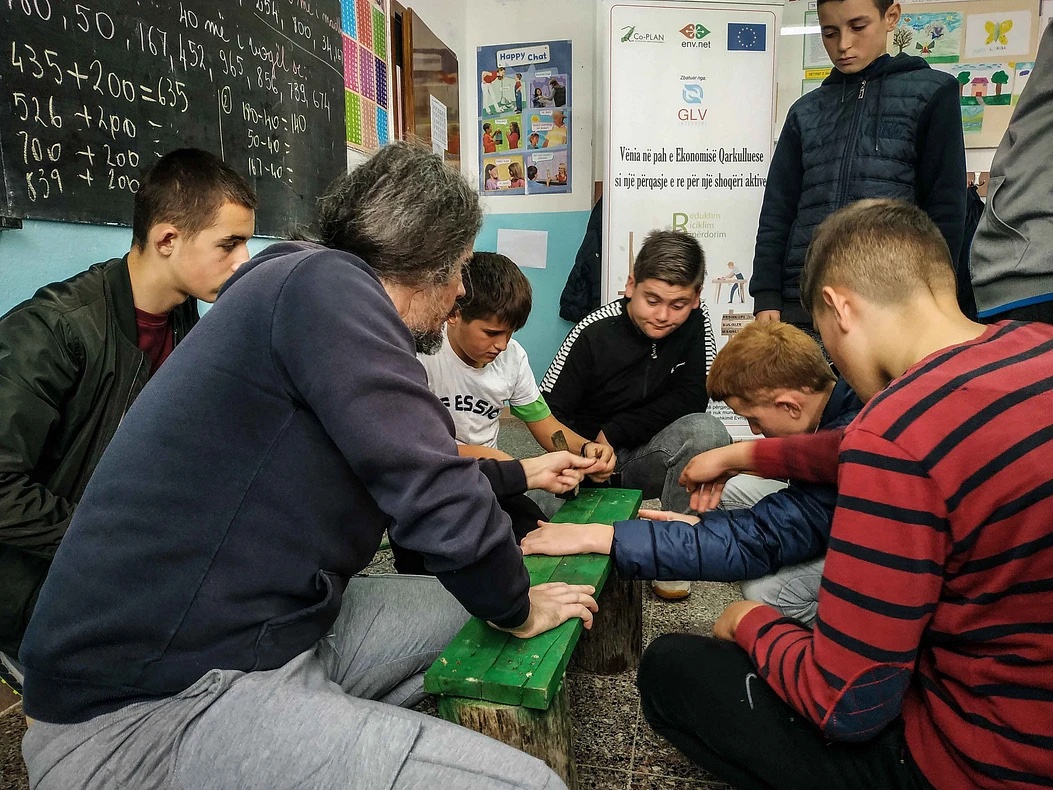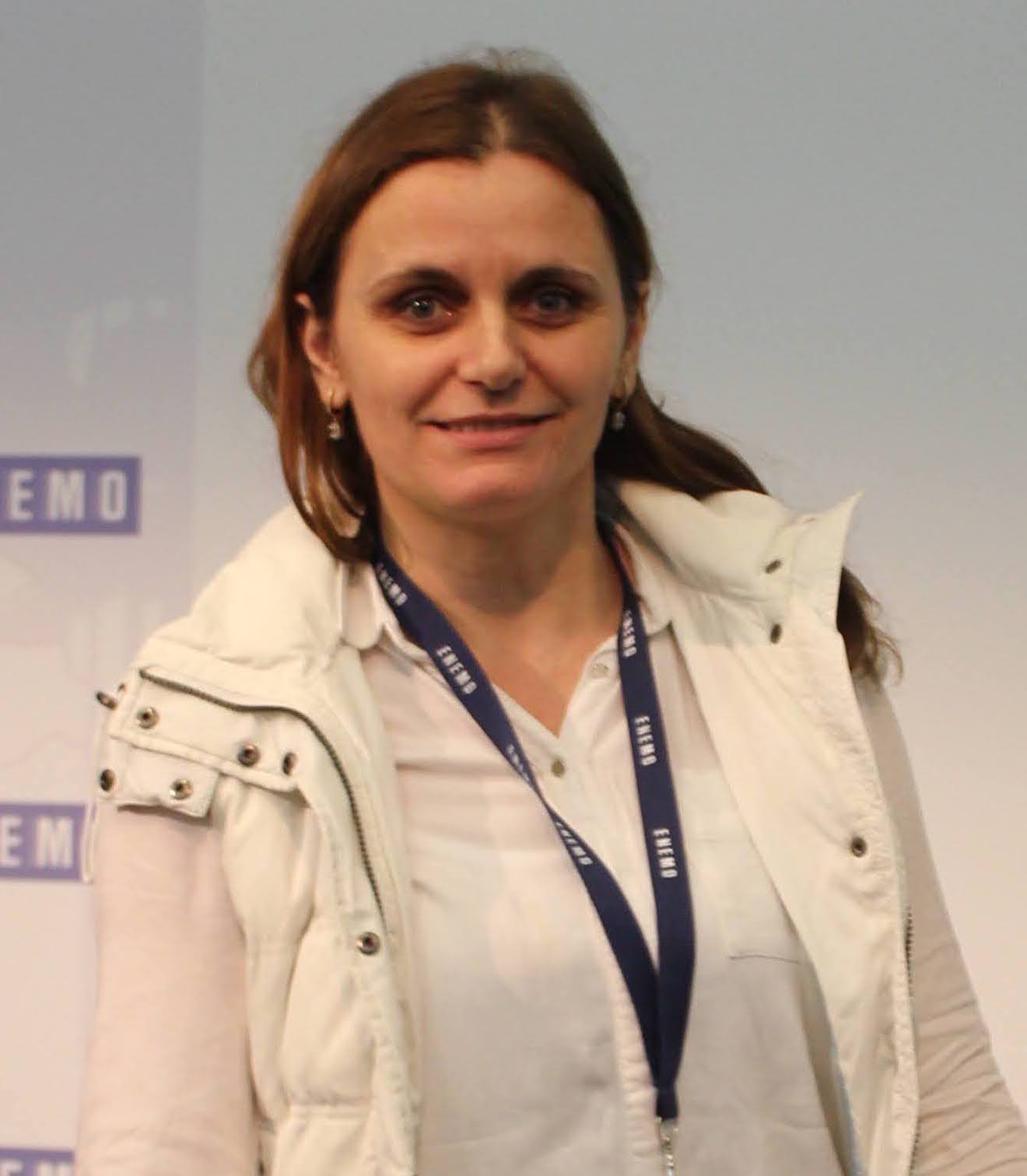
The municipality of Dibër is located in a mountainous region on the bank of the Black Drin River in northeast Albania, close to the border with North Macedonia. Dibër is heavily affected by emigration, in particular of young people, many of whom do not see a future in the region. However, a local non-governmental organisation, Local Action Group (LAG), has been working for years now to make the place interesting for youngsters by offering them an opportunity to contribute to society and be more active.
Erblina is a 21-year-old from Dibër currently studying medicine in Tirana. She has been part of the Local Action Group since she was 16 years old, and continues to contribute when she comes home for the holidays. She explains that she has been an activist since the ninth grade. ”I benefited a lot from volunteerism: it helped shape me as a person. There is also this great feeling when you help and your contribution yields results,” she says.
“We decided that we needed to do something to fill the gap, through advocacy and lobbying for human rights.”
Kimete Mazari, NGO Local Action Group Dibër
Capacity building for strengthening local action
The Local Action Group was founded in 2016 by Kimete Mazari. Back then, Kimete was working as a teacher and for the International Red Cross. She explains that Dibër is one of the poorest regions in Albania, where apart from poverty there are also issues with the traditional mentality that has an impact on human rights. She saw that there was very little being done to address this issue. “So, we decided that we needed to do something to fill the gap, through advocacy and lobbying for human rights,” she says.
Being a local organisation in a remote location, Kimete and her friends had very little experience of what was needed to run an NGO, and few opportunities to gain the necessary skills. Luckily for them, a chance was provided by the EU-funded Technical Assistance to Civil Society Organisations (TACSO) project whose mission is to improve capacity and strengthen the role of civil society organisations in the Western Balkans.
With the knowledge gained through TACSO, the LAG has been able to implement and contribute to the community through projects focused on human rights and other topics. Their first project, which was focused on prevention of family violence, and was also funded by the EU, is one of the most important ones for Kimete. She explains that because Dibër is a very traditional region, women were highly reluctant to speak out about cases of family violence and abuse from the men in their families.
“It is very difficult for women in rural areas to speak about or seek help on the topic of violence. The fact that we were a local organisation was highly beneficial in this regard as we had easier access to households and visited house by house, and talked to many vulnerable women and supported them in many ways,” she says.

“The EU TACSO project has been with us since day one, and they have been essential to our success.”
Kimete Mazari, Local Action Group NGO Dibër
For Kimete, the organisation’s greatest success may be the involvement of young people in their activities. The organisation currently has over 300 active volunteers who contribute on a regular basis. “Dibër doesn’t have any youth organisations or representation of youth at local level. By including them in our organisation’s activities we provided them an opportunity to help others but also an opportunity for their voice to be heard,” says Kimete.
However, Kimete emphasised that without the support of TACSO perhaps none of these projects would come to life. TACSO trained her team in many ways, including on project proposal writing, financial management of projects, the best ways to use volunteers, digital outreach communication techniques and many other useful skills. “The EU TACSO project has been with us since day one, and they have been essential to our success,” she says.
About the project
Technical Assistance to Civil Society Organisations in the Western Balkans and Turkey (TACSO) is a regional project funded by the European Union that improves capacities and strengthens the role of civil society organisations (CSOs). The project assists CSOs to take an active part in democratic processes in the region, and it also stimulates an enabling environment for civil society and pluralistic media development.
The project works in Albania, Bosnia and Herzegovina, Kosovo, North Macedonia, Montenegro, Serbia and Turkey. TACSO is a part of the Civil Society Facility EU mechanism that provides support to CSOs in those countries that are not yet part of the EU. CSOs play an important role for the EU as key actors in supporting their country’s accession process.
Photo credits: LAG
Erblina is a 21-year-old from Dibër currently studying medicine in Tirana. She has been part of the Local Action Group since she was 16 years old, and continues to contribute when she comes home for the holidays. She explains that she has been an activist since the ninth grade. ”I benefited a lot from volunteerism: it helped shape me as a person. There is also this great feeling when you help and your contribution yields results,” she says.
Capacity building for strengthening local action
The Local Action Group was founded in 2016 by Kimete Mazari. Back then, Kimete was working as a teacher and for the International Red Cross. She explains that Dibër is one of the poorest regions in Albania, where apart from poverty there are also issues with the traditional mentality that has an impact on human rights. She saw that there was very little being done to address this issue. “So, we decided that we needed to do something to fill the gap, through advocacy and lobbying for human rights,” she says.
Being a local organisation in a remote location, Kimete and her friends had very little experience of what was needed to run an NGO, and few opportunities to gain the necessary skills. Luckily for them, a chance was provided by the EU-funded Technical Assistance to Civil Society Organisations (TACSO) project whose mission is to improve capacity and strengthen the role of civil society organisations in the Western Balkans.
With the knowledge gained through TACSO, the LAG has been able to implement and contribute to the community through projects focused on human rights and other topics. Their first project, which was focused on prevention of family violence, and was also funded by the EU, is one of the most important ones for Kimete. She explains that because Dibër is a very traditional region, women were highly reluctant to speak out about cases of family violence and abuse from the men in their families.
“It is very difficult for women in rural areas to speak about or seek help on the topic of violence. The fact that we were a local organisation was highly beneficial in this regard as we had easier access to households and visited house by house, and talked to many vulnerable women and supported them in many ways,” she says.

For Kimete, the organisation’s greatest success may be the involvement of young people in their activities. The organisation currently has over 300 active volunteers who contribute on a regular basis. “Dibër doesn’t have any youth organisations or representation of youth at local level. By including them in our organisation’s activities we provided them an opportunity to help others but also an opportunity for their voice to be heard,” says Kimete.
However, Kimete emphasised that without the support of TACSO perhaps none of these projects would come to life. TACSO trained her team in many ways, including on project proposal writing, financial management of projects, the best ways to use volunteers, digital outreach communication techniques and many other useful skills. “The EU TACSO project has been with us since day one, and they have been essential to our success,” she says.
About the project
Technical Assistance to Civil Society Organisations in the Western Balkans and Turkey (TACSO) is a regional project funded by the European Union that improves capacities and strengthens the role of civil society organisations (CSOs). The project assists CSOs to take an active part in democratic processes in the region, and it also stimulates an enabling environment for civil society and pluralistic media development.
The project works in Albania, Bosnia and Herzegovina, Kosovo, North Macedonia, Montenegro, Serbia and Turkey. TACSO is a part of the Civil Society Facility EU mechanism that provides support to CSOs in those countries that are not yet part of the EU. CSOs play an important role for the EU as key actors in supporting their country’s accession process.
Photo credits: LAG
Please wait while your video is being uploaded...
Don't close this window!